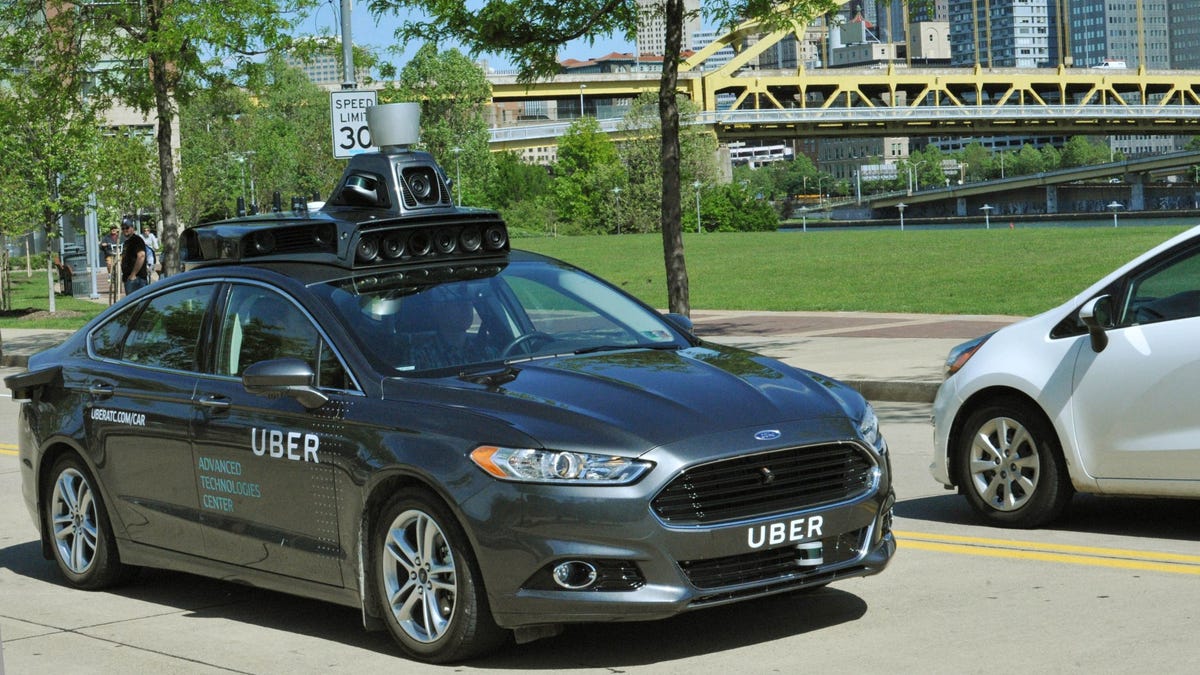Uber to Waymo: We aren't using your self-driving car tech
The legal battle heats up as Uber calls Waymo's claims demonstrably wrong and a "misfire."

Uber responded to Waymo's lawsuit over self-driving cars.
Uber has fired back at Waymo in the legal battle over the future of self-driving cars.
The ride-hailing company said in a court filing Friday that Waymo, formerly known as Google's self-driving car unit, has wrongly accused Uber of stealing trade secrets to develop its autonomous cars.
Uber also asked the court to deny Waymo's request for an injunction against Uber's self-driving car program and said Waymo's accusations were "demonstrably false."
The crux of Waymo's lawsuit, filed in February, is the claim that a former Google employee, Anthony Levandowski, stole 14,000 "highly confidential" files before he left to found his own self-driving trucking startup. Uber bought the startup, Otto, last year.
Levandowski helped develop Waymo's lidar technology, a key component in self-driving cars that lets the vehicles "see" their surroundings and detect traffic, pedestrians, bicyclists and other obstacles. The company alleged that the stolen information has benefited Uber as it's developed its own driverless car tech.
In its court filing, Uber said its lidar technology is "fundamentally different" from Waymo's.
"Waymo's injunction motion is a misfire: there is no evidence that any of the 14,000 files in question ever touched Uber's servers and Waymo's assertion that our multi-lens LiDAR is the same as their single-lens LiDAR is clearly false," Angela Padilla, associate general counsel at Uber, said in a statement. "If Waymo genuinely thought that Uber was using its secrets, it would not have waited more than five months to seek an injunction. Waymo doesn't meet the high bar for an injunction, which would stifle independent innovation and competition."
This is the first time Uber has publicly laid out its side of the case since Waymo's February filing of the suit, which is being heard in the District Court for the Northern District of California.
Pitting two of Silicon Valley's biggest tech titans against each other, this high-stakes legal showdown seems like something out of a spy novel. It centers on Waymo's claims that Uber allegedly stole secret self-driving car technology and includes everything from accusations of theft to Uber's key witness pleading the Fifth to avoid self-incrimination.
In the filing, Uber said it searched its computers and didn't find any of the files in question.
Waymo said Uber isn't searching in the right place.
"Uber's assertion that they've never touched the 14,000 stolen files is disingenuous at best, given their refusal to look in the most obvious place: the computers and devices owned by the head of their self-driving program," a Waymo spokeswoman said in a statement. "We're asking the court to step in based on clear evidence that Uber is using, or plans to use, our trade secrets to develop their LiDAR technology, as seen in both circuit board blueprints and filings in the State of Nevada."
Uber also said in its filing that it's relying on a third-party manufacturer, Velodyne Lidar, for its lidar technology, instead of its own in-house design like Waymo does.
Cloak, dagger, self-driving car
Levandowski left Google in January 2016. Four months later, he co-founded Otto, which was then acquired by Uber in August for $680 million.
"Mr. Levandowski took extraordinary efforts to raid Waymo's design server and then conceal his activities," reads Waymo's original complaint.
Waymo said it learned of the alleged theft after a supplier accidentally emailed a Waymo employee a diagram of Uber's lidar dashboard.
"This circuit board bears a striking resemblance to Waymo's own highly confidential and proprietary design and reflects Waymo trade secrets," Waymo's complaint reads.
Waymo has accused two other former Google employees of allegedly downloading proprietary files. It also claims that Levandowski and Lior Ron, another Otto co-founder who previously worked for Google, allegedly poached Google employees using confidential information, such as details of salaries and compensation packages.
The case is against Uber, however, not Levandowski and his cohorts. Testimony submitted by Waymo alleges that Levandowski met with Uber before Otto was founded, though Levandowski said those meetings were to look for investors for his new company.
Self-driving cars are a hot topic in the auto and tech industries. Automakers from Toyota to Ford to Volvo all have projects under way. And besides Google and Uber, other Silicon Valley giants, like Apple, Intel and Tesla Motors, are betting on the tech. If the judge presiding over the case sides with Waymo, Uber may be forced to halt its project, which already involves autonomous vehicles in Pennsylvania, Arizona and California.
Michael Brophy, intellectual property attorney with Withers Bergman, said cases like this often end up with one of three outcomes: quick settlement; dismissal of the suit for lack of evidence, lack of legally protectable property or another defense; or public trial.
"These matters are often made more complicated by other factors, such as cross-claims or third-party litigation, unexpected testimony or evidence, market events, or insolvency," Brophy said. "Until Uber starts mounting its defense, it will be difficult to predict which of these outcomes seems most likely or how Uber's alleged evidence and potential factual claims may impair Alphabet/Waymo's efforts to reach its goals."
As high-profile as the legal battle is, Uber hopes parts of it will take place outside of public view. The company filed a motion last month requesting that the disputes around trade secrets be resolved in private arbitration instead of public court. The hearing to decide this matter is scheduled for April 27.
Tech Enabled: CNET chronicles tech's role in providing new kinds of accessibility. Check it out here.
Life, disrupted: In Europe, millions of refugees are still searching for a safe place to settle. Tech should be part of the solution. But is it? CNET investigates.



